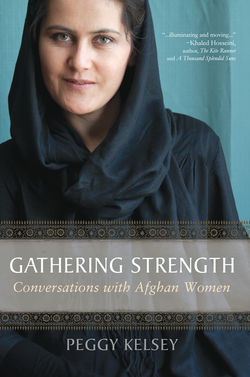Читать книгу Gathering Strength: - Peggy Kelsey - Страница 9
На сайте Литреса книга снята с продажи.
ОглавлениеIn Focus: Sana
Sana
Everyone looked at me. They said, "She’s disabled and she’s coming outside!" In Afghanistan, disabled girls don’t go outside, not even to go to school or take courses.
Every afternoon, 15-year-old Sana hobbled into my room at the School of Leadership, Afghanistan (SOLA) guest house on her crutches, to tell me about her day. A whirlwind of energy and delight, she talked a mile a minute, her face expressing all of the drama in any story she shared. She had a beautiful singing voice and was very proud of her part in a promotional video for Solace for the Children.
Sana was born in Kabul and went to Pakistan when she was very young. At nine, she was diagnosed with polio, and suddenly lost her ability to walk. When she and her family returned to Afghanistan, she got crutches from the Red Crescent and resumed her studies. One winter afternoon, Ted Achilles, SOLA’s founder, saw her fall, get up, fall again, and get up again, and he invited the determined young woman into his program. Since then she has traveled to the US with Solace for the Children for life-saving operations. She returned to the US in 2011 for more operations and a year of university preparation. Now she is studying at the American University of Afghanistan.
Peggy: What is it like for a disabled person in Afghanistan?
Sana: It is very sad and lonely to be disabled here. When I first couldn’t walk with my legs, I walked with my hands, but I was always left at home when my family went out to weddings or parties. I stayed home and talked with the walls; I talked with spoons; I talked with anything.
When we came back to Afghanistan, my mother took me to the Red Crescent and they gave me some crutches. My family agreed that I could go to school and I was so excited! I went to class and sat in an empty chair. Then the teacher called me to the front of the room and told me that since I was disabled I didn’t need to come to school. I cried, but she wouldn’t let me stay. My brother said I could come to school, so I went back the next day, and she sent me home again. I kept going back every day, and finally the teacher took me to the principal’s office. I told the principal that if she didn’t want me in school, then I would go to the Ministry of Education. She said that I should be allowed to come.
After a year, I decided to take an English course. It was very hard because it would take me an hour to go from my house to the street where I could catch the bus. At the bus stop, it was very crowded and people pushed me. When it was winter, I kept falling on the ice. When I would fall, it hurt and I would cry, and small boys would laugh at me and throw stones. But I kept going and I was top of my class.
Peggy: Are there any schools or organizations to help disabled people in Kabul?
Sana: There is the Community Center for the Disabled (CCD),1 but I don’t know of any others besides the Red Crescent.
Peggy: Those with physical or mental disabilities, especially women, children, and the elderly, face negative social stigmas that often result in their being hidden away at home. A dozen or so organizations provide services, but due to lack of funding they only reach a small percentage of those who need assistance.
When somebody tells you that you can’t do something, how do you react?
Sana: I say, "Okay; I’m disabled, but that doesn’t stop me." I don’t show that I’m feeling sad or angry, I just tell myself, "I’m going to school." I hide my feelings and just pretend everything is fine.
When people laugh at me, I don’t show my face [my feelings]. When they throw stones at me or push me down, I don’t show my face. I just go home and cry. I don’t show it to my family, either, because maybe they will tell me I can’t go to school. So I’ve learned to cover up my feelings.
Peggy: What are your hopes for the future?
Sana: I want to study politics. I want to help the women who beg in the streets and kids who are working and not going to school. I want to help disabled girls who have to stay at home.
Peggy: What else would you like to say?
Sana: I want my people to help disabled girls and poor women. A lot of girls burn themselves because they were married to old men. I saw with my own eyes a seven-year-old girl who was married to a 40-year-old man. Helping these girls gives me hope.
